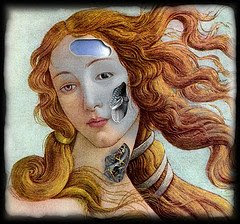Contents: Socratic inquiry into the nature of ethics; jigsaw reading; jigsaw listening to a radio interview with ethicist Prof. Margaret Somerville.
Teacher's Notes
Starter
The class debates the following statement: "There are somethings that are inherently wrong - that is, there is a universal ethic or set of values. "
Procedure: Those who agree, go to one side of the class those who disagree go to the other.
Objective of each team is to persuade members of the other team to join them.
When someone wants to speak they take a soft rubber ball, deliver their argument and throw the ball to the opposing team.
Introduction
Part 1
In this lesson your teacher will ask you a series of questions on ethics in general and about ethics in relation to science and technology.
You will be put into small groups of 2-3 students and you will have about 5 minutes to think about and articulate your answers for the question your teacher gives you.
Your teacher will then ask you to share your anwers with the class as a whole. The class will be able to discuss your answers.
Socratic Inquiry /"Own Story"
1.What is ethics?
Some helpful expressions:
- I think ethics could be defined as...
- A possible definition of ethics could be...
- Most people define ethics as...
- Ethics means...
- My definition of ethics is...
2. Consider one of the following issues and decide whether they are right or wrong:
- Gay/lesbian marriage
- cloning
- genetically modified crops
- the extinction of the polar bear
3.Why is it hard to decide whether these things are right or wrong?
4. Nowadays people seem to be preoccupied with ethics, both in the sciences and in the rest of society (Toulouse, 2006; Somerville, 2006). Why do you think this is so?
Jigsaw Reading & Listening Comprehension/ "Expert"
- Work in pairs.
- You will be assigned either a erading or a listening exercise
- The reading involves 1 of 2 extracts from the book The Ethical Canary by the world's leading expert on ethics, Margaret Somerville. One of you will read Extract A and the other will read Extract B. When you have finished answer the questions that go with it. When you have done that explain your answers to your partner. Your teacher will then ask some students to paraphrase their partner's answers for the class.
- The listening exercise involves listening to 5-6 minute s of an interview with Margaret Somerville and answering the questions that relate to it. When you have done that explain your answers to your partner. Your teacher will then ask some students to paraphrase their partner's answers for the class.
Reading
Extract A
"Why has this search for ethics emerged now? In our postmodern, industrialized Western democracies? They are societies characterized by being pluralistic, secular in the public square and poltically, and multicultural. These same features mean that these societies lack a 'shared story' - the collection of fundamental values, principles, beliefs, myths and commitments that we use to give meaning to our communal lives. This story, or societal-cultural paradigm, is the glue that holds us together.
However, at present, in secular societies we are in search of a new story. Some of the factors that have caused the collapse of our old story result from the extraordinary advances in science and technology, the neurosciences, nanotechnology, artificial intelligence or molecular biology and genetics. The possibilities these advances open up are mind-altering, society-altering and world altering and, depending on how we use them, could radically alter our human nature or even annihilate us. We have become very sensitive to the threats that these new technologies present to our physical existence and our planet." (p.18)
Extract B
"Our contemporary search for ethics shows, I believe, that we are becoming much more sensitive than have been to [the] threats to our human spirit - the deeply intuitive sense of relatedness or connectedness to all life, especially other people, to the world, the universe and the cosmos in which we live; the intangible, invisible, immeasurable reality that we need to find meaning in life and make life worth living. In short, the human spirit is the metaphysical reality (that which is beyond the physical) that we need to fully live fully human lives." (p.18)
"Can we in practice implement a view that something - for instance human cloining - is inherently wrong in a society that has no absolute moral rules or no external source of authority for those moral rules that it does have? Can we believe in a moral absolute, even if we are not religious and even if we do not believe in a supernatural being as the ultimate authority? I propose we can do this by accepting two values, which are probably two sides of the same coin, as absolutes. First, we must always act to ensure profound respect for all life, in particular, human life; second we must protect the human spirit, which I defined earlier in this chapter. If our development or use of any given scientific technology, for example, would seriously harm the fulfilment of these two values, it is inherently wrong." (p.25)
Question for Extract A
pluralistic
secular
the public square
lack
glue
alter
threats
2. Compare the answers given to questions 3 and 4 with the opinion of Margaret Somerville expressed in Extract A.
Questions for extract B
1. Explain the following terms using either your own general knowledge or if you can't use a learners dictionary such as the Collins Cobuild Dictionary. You may like to use an on-line dictionary such as the Merriam-Websters. In your explanation say what part of speech it is, i.e.,
is it a verb, adverb, a noun, a compound noun, or an adjective?
connectedness
intangible
metaphysical
implement
inherently
a moral absolute
harm
fulfillment
2. Margaret Somerville believes there should be actions that are inherently wrong in order to generate ethical rules in modern secular society that everyone can agree on. Explain to your partner how she proposes to do this.
Listening
Listen to part of an interview with Margaret Somerville where she talks about her principal ideas.
This is an information gap listening. You will be placed in one of five groups. Each group is responsible for part of the listening exercise. Your task is to listen to your assigned part answer the questions and share them with the members of your group. Once you have done this you will then share them with the class. While listening to your class mates you should take notes and ask questions if you don't understand.
Please Note
You will find this a challenging listening. It is challenging for a couple of reasons. Firstly, because it is authentic and not tailored or simplified for English language students. Secondly, Somerville has a lot to say and very easily answers questions drawing in a maximum amount of information that does not initially appear to be relevant to the interviewer's questions. Best of luck!
Some vocabulary and expressions
to bring you down to tin tacks = to make you talk about specifics
to cause a fuss = to make irritating problems
cubby hole = a small cupboard without a door - in this context refers to an intellectual's safe and comfortable place in the academic world
to have a run in with someone=to have an argument with someone
to feel out on a limb = to feel vulnerable
- Listen to Margaret Somerville - RealMedia
- WinMedia
- Margaret Somerville ABC Radio interview information page
1.Why is Margaret Somerville protected by body guards ? 1:30-3:00 mins.
2. What is her stand on gay rights? 1:40-2:00 mins.
3. How does she feel about pain? Explain why she opposes circumcision of infants. What are some benefits of circumcision? 3:06-4:14 mins
4. Margaret Somerville was accused of anti-semitism because of her opposition to the practice of circumcision on infants. However, five Jewish rabbis defended her. Why? 4:13-4:42 mins.
Group 2
5. Why has she become the most cited academic in Canada? 5:03-5:30 mins
6. Why is Somerville always in the media? 5:57-7:05 mins
7. Somerville has a taste for controversy. Retell her run in with her teacher Sister Rosemary at the age of seven, and then explain why she may like being in controversial situations. 7:05-9:45 mins.
Group 3
8. What is Somerville's definition of ethics? 9:45-10:12 mins
9. Explain why she opposes same sex marriage. 11:01-16:30 mins.
-What does she mean by "Can the future trust us?"
-Talk about the definition of marriage
-Mention advances in medical science to enable homosexual couples to have their own genetic children
-What are 'the civil unions' in the UK and le pax civile in France and why were they created?
Group 4
10. What is transhumanism and what are her views on it? 16:35-20.00 mins.
-What is her major project?
11.She claims that the evolutionary biologist Richard Dawkins the author of The God Delusion is "mystically tone-deaf", what does she mean by this? 20:02-21:35 mins.
12. Richard Dawkins blames all the evils in the world on religion. What is Somerville's response to this? Do you agree with her reasoning? 21:35- 22:48 mins.
Group 5
13. What are Somerville's thoughts on the existence of God and an afterlife? 22:49-25:33 mins.
14. Somerville cites a Japanese saying, explain what it means and why she said it. "As the radius of knowledge expands the circumference of ignorance increases."25:33-26:00 mins.
"Critique"
In your groups say whether you agree or disagree with Margaret Somerville. Give your reasons. Present your conclusions to the class.
"Evaluation"
Without talking to your neighbour write no more than 70 words describing what you learnt, in other words have your opinons changed or have they been confirmed? Submit your comment as comment to this post.
Writing Assignment
1) Writing Definitions of Terms
In small groups try to write definitions of the two central ideas contained in the two extracts: society's shared story and the human spirit .
The general rule for composing definitions is to first state the term, then say into which class of ideas or things it belongs and finally to identify its distinguishing characteristics; that is, the things that separate it from other things in its class.
For example:
Ethics (term) is a branch of philosophy (class) that deals with the study of the rightness and wrongness of thoughts and actions (distinguishing characteristics).
2. Write a blog comment
After having done the reading and listening exercises in no more than 70 words give your opinion on one of the following topics:
- Transhumanism
- Same sex marriages
- Somerville's moral absolutes: Protect life, especially human life, and the human spirit
Say whether you think they are right or wrong and explain why. Leave your answer as a comment to this blog.
Key points
Somerville is interested in making the physical and spiritual essence of humanity sacred and therefore inherently wrong to compromise it. It is similar to the idea that we are OK the way we are and it is not for us to interfere with who we are.
This leads to the question of whether we should freeze human evolution or participate actively in it. According to the transhumanists, Homo sapiens is an imperfect species and we have the unprecedented opportunity, through the new genetic sciences, to become whatever our imaginations can dream up.
The notion of protecting the current human condition or essence is analogous to the preservationist approach to the conservation of biodiversity. In this case a natural site is preserved and any seemingly unnatural changes are blocked. This involves the elimination of invasive species. A high profile example is the extermination of the North American grey squirrel in some parts of Britain to favour the native red squirrel. This is the subject of the next lesson, follow the link below:
Follow-up lesson:
Connections between two ethical issues & Your World View
- References
- Somerville, M. (2006) Searching for ethics in secular society. In ten Have, H. ed. Ethics of science and technology. UNESCO, Paris. pp. 17-40
- Toulouse, G. (2006) Scientific revolutions and moral revaluations. Science and Society : New ethical Interactions. Milan: Fondazione Carlo Erba
- Photos from Flickr.com
- Deforestation Madagascar by DawaFree
- Madagascar periwinkle by Rana Pipiens
- Abu ghraib by luna park
- Cranes by tinyfish
- Hands and fetus by ws-sanctuary
- Honey bees disappearing by Paul_T
- Lesbian wedding by Dr. Cedric
- Nuclear power plant by aerial photography
- Pollution- viva kyoto by pfala
- Venus Cyborg by Tartx
- Avicenna (Ibn Sina) by Socialist Art by Night Eulen
- Taoism by princess tiger lily
- All extracts from The Ethical Canary used with permission from Margaret Somerville
© All Copyright, 2008, Ray Genet







+II+-+socialist+art+by+night+_eulen.jpg)









16 comments:
It is a good purpose to try to avoid undesirable aspects of human contidtion. But what is difficult is to define the bound between what is necessary and what is not. It is all the more difficult since some people are ready to pay a lot to have the "improvements" they want and some others are ready to be paid without feeling concerned about ethical questions. These questions should not be minor questions.
Concerning same sex marriages, I disagree with Somerville's views on it. OK, gay and lesbian community should be considered as well as heterosexual people, indeed they have the same right than the others to marry themselves. The point is: should they bring up children or not? If they really want it, not just a fancy (because we always want what we haven't!), then why couldn't they share their love? All is a matter of education, for gay parents, for people in general. What about the equilibrium of such a family? I think that sometimes in "normal" family, people make a child with caprice as if they bought a dog, and nobody blame them.
gay/lesibian relationship still cause controversy between people.Many questions don't have answers,may be due to this issue's ethical nature.
Homosexual relationship isn't a recent subject,however governements recently make steps to approve it.yet they are forced to prove their existance inside societies.
the main obstacle is our traditional conception of a family: a wife ,a husband and children,we aren't able to accept the fact that two men are able to love each other deeply enough to set up a home and raise children and we are less tolerent when it comes to allow them to marry and have their biological children by some transhumanian procedure.It's true that we don't have the right to prevent them from having a family but have they the right to decide the future of a human beeing by manupilating the only thing that makes him human and not an object???
I think that Margaret Somerville is right when she says that gay people shouldn't marry themselves, that means having children. Actually that could have serious consequences on the child. He can feel different from other children because he would have 2 mothers(fathers).
Moreover that could have a psychological effect on him, and could even make him becoming like his parents.
Nevertheless, the fact that they can live in couple is not a problem.
About transhumanism...
There are several kinds ob improvments: the help for handicapped people, and others (improvment of abilities of healthy people).
The fact of helping people who NEED is animated by a good feeling, but people have to take care of drifts, possibly caused by abuse of technology.
By the way, what could be the usefulness of so much technology on human beings? Would transhumanists remain definitely human ?
And, one of the major question:
has science proved that all these improvments were safe?
If gay and lesbian people feel good, I don't blame them for living together, but I don't think they have the right to make a child suffer from it. Do you think of the mockery he would have to endure from his comrades? How would he feel about that? Let alone that having two fathers or mothers is unbalanced. A child needs both a masculine and a feminine presence. Besides, he would like to know who are his real parents, so requiring a third person would be too much for him. All these reasons let me think that a child raised in an homosexual family would feel nothing but trauma. And I don't think any child deserves it. So if same sex marriages are not allowed, either these situations wouldn't exist or at least would be against the law.
"If gay and lesbian people feel good, I don't blame them for living together, but I don't think they have the right to make a child suffer from it.Do you think of the mockery he would have to endure from his comrades?"
First of all, an implicit meaning: you "don't blame them"; so, you could? I think you wouldn't "blame" heterosexual people for living together... I deduce that you are shocked by homosexual people, but you tolerate them.
Then the snake eats its own tail. You're not a bad guy, but these "comrades" are worse, sure. Child of homosexual couples won't be tolerated, so you don't tolerate them. Easy demonstration, too easy.
Just an example: when women tried to get the same rights than men. Would have you told them: "Oh no, it has never been done before, people will mock you for working, wearing pants, voting... I think you'll be ridiculous." Isn't it misogynous speaking?
"A child needs both a masculine and a feminine presence."
Ok, so let's forbid divorces, and impose mariage to widows... Actually this is a very complex issue and even psychologists don't know what to answer. Maybe two parents are better than a single one...
PS: sorry for targeting you, Laurent. I don't like it.
About transhumanism, I disagree with Somerville's view. For so long as Human kind exist, it's known that we always are looking new technos to pass over our natural limits. Ancients grecs said that the Titans given us the Technikae after giving every natural gifts to animals. Every step in history of humanity is based on new tools, new equipment. The difference now is that technology can change our DNA, our body, or create body's parts, which is for some what we are. So the question, is no more can we use technologie to get through human abilities, but what is the limit between extend our own abilities and change what we are. I trust we can't stop to get further in science and technologies, the only limit that I'm affraid of, is the possibilty that we could create an artificial mind.qchjkwy
A shared story is a lesson that we learned from people who lived before to help you, me and everybody to live all together.
The human spirit is something you can't see or hear or touch that everyone has and that lets us feel you can respect everyone and everything.
Here are our definitions for Human spirit and Shared story :
human spirit is the metaphysical concept that every human being has a deep sense of relatedness to all life
shared story is a concept wich represents a collection of values deeply shared by a group of people
Now, the same but for 8 years old children :
shared story is everything that a whole society shares and that make people feeling as part of a group
human spirit is the idea that everyone has the skill to be linked with what goes on to nature
For Sommerville (2006) the shared story is a set of memories, of rules, a common teaching, a common History that members of a group share, and that make them be like in a family.
Shared stories is a group of things that happen in the past or that people think which let us better know each other and let us live as we were a whole family.
The human spirit is the gift we all have to feel things and to share them with our peers by crying, laughing, shouting, becoming angry or joyful: this is a means to share what we think, which is called "emotions".
The human spirit is the gift we all have to feel things and to share them with our peers by crying, laughing, shouting, becoming angry or joyful: this is a means to share what we think, which are called "emotions".
Dear Margaret,
I have read your writings about the Human Spirit and also the ones of Lao-tse about the Dao. Therefore I would say that even if both texts deal with the idea of an intangible law which links all of us, you are not describing the same thing. Lao-tse talks about it like it was a divine rule that runs the entire world and out of which we should learn, where as, you see the Human Spirit as an achievement for the human being, finding the right way to lead our lives. I would say that according to you this law already exists for the Human being and it is our duty to respect it, however in Lao-tse’s view: we should create our own way of life watching the world running around us.
Best regards.
Post a Comment